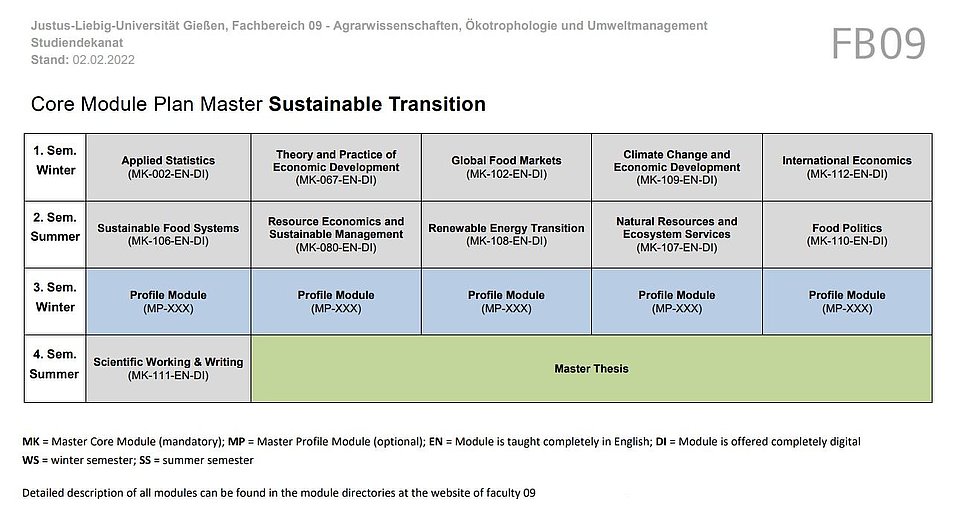Course of Study
Composition of the Degree Programme
Our modules offer a wide spectrum of different teaching methods including synchronous online teaching such as lectures, seminars and group discussion as well as asynchronous elements such as videos and individual work tasks. Students complete each module with a final examination and the individual module grades determine the final grade of the entire study programme.
The programme schedule consists of eleven mandatory modules (core modules), five optional modules (profile modules), and the master thesis. Having completed the core modules the students are well equipped with a solid scientific education and ready to broaden their knowledge in specific research areas. By individually choosing their profile modules from a diverse range of study areas students shape their individual competence profile.
Core Modules
- Theory and Practice of Economic Development (6 CP)
- Global Food Markets (6 CP)
- Sustainable Food Systems (6 CP)
- International Economics (6 CP)
- Climate Change and Development (6 CP)
- Resource Economics, Sustainability & Environmental Management (6 CP)
- Renewable Energy Transition (6 CP)
- Natural Resources and Ecosystem Services (6 CP)
- Food Politics (6 CP)
- Scientific Working and Writing (6 CP)
Profile Modules
Students tailor their individual profile by selecting five modules from the catalogue for digital degree programmes. Among the modules for this study programme are the following:
- The Economics of Nitrate Pollution
- Python for Environmental Scientists
- QGIS
- Insects for Food and Feed Production Systems
- Agriculture, Ecosystem Functioning and Climate Change
- Land Governance for Sustainable Land Use in Africa
- Special Topics of the UN Sustainable Development Goals I
- Special Topics of the UN Sustainable Development Goals II
- Applied Statistics
On-Site Courses during the Summer Vacation
Several profile modules are offered as block modules with physical attendance in Giessen during the summer vacation. These modules are optional and you can attend them if you wish to be physically present in Giessen during your studies. If you are interested in attending some of these modules, please contact the study coordinators of the Faculty 09 at studiesprotect me ?!fb09.uni-giessenprotect me ?!.de for further information.
Master Thesis (24 CP)
Students dedicate the major part of the 4th semester to writing the master thesis. With the thesis, they prove their capability to investigate a given topic independently and scientifically within a given timeframe. The core module Scientific Working and Writing supports students in their research process.
Degree
Master of Science (MSc)
Duration of Studies
4 semesters – 120 credit points (cp)
Application Process
Foreign applicants outside the European Union who do not have a German Bachelor Degree, must submit their application to JLU Giessen via uni-assist. No study fees are charged for this study programme. However, students have to pay a semester contribution of approx. 100 EUR for administration. Please note that you can only apply once a year for the winter semester. You can also find out more information on the prerequistites and the application process on this website.
